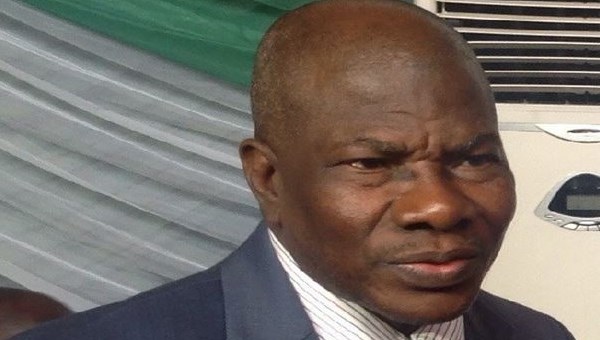E-Financial
Insurance Commissioner Urges Operators to Embrace Disruptive Innovations

Mr. Sunday Thomas, the Commissioner of Insurance, has charged practitioners in insurance sector to embrace disruptive business models in order to be able to build an industry that would withstand future changes in the sector.

Thomas, gave this charge recently, when he spoke at the Lagos Chamber of Commerce and Industry’s (LCCI) 2021 Insurance Stakeholders’ Consultative Forum with the theme “Nigeria’s Insurance Industry: Breaking New Frontiers,” which was hosted virtually in Lagos.
He said insurance operators in the country should avoid too much reactive thinking and embrace disruptive innovation since the things the industry have been leaning on might not sustain it in the nearest future.
He said: “We are living in an age of disruption. The insurance sector is facing significant waves of disruption and important decisions about market positioning, ecosystem relationship, technology, investments in skills requirements need to be taken,” adding that, “key drivers of change include the changing nature of risks which are now too complex to fit into the insurance industry’s traditional lines of business structure.
“The time for talent development for disruptive innovation is now for a new market and value network. It, therefore, means that to break new frontiers is to at least be an inch ahead of unavoidable disruptions of our business models, markets etc. So, it is not just innovating but rather disruptive innovation.”
He said the quest for talent development and disruptive innovation would enable the industry to move from the status quo, adding that, “one assurance I can give is that the NAICOM will never go against any great idea that will create desired result. Let all of us come together and look for ways we can create a future for our industry.
“We want innovations that are disruptive to create the needed market. Therefore, we must have a mindset that is disruptive.”
He said it was expected that companies should ensure that capital management in ways that would create value in the face of the new market frontiers, while, “its primary objective must be to optimise capital structure, performance and adequate for risk undertaken.”
Thomas, noted that the prevailing low insurance penetration in the country, “is a sign that there are more grounds to be tilled and more harvests to be made.”
He said there was need for regulatory reforms that would reposition NAICOM for both today and the future by breaking existing barriers in the insurance sector because, “we (NAICOM) are concerned about our service delivery and it is important for us to focus on it.”
He also added that the new insurance bill, which is before the National Assembly, would introduce improvements in the legal regulatory framework of the Nigerian insurance industry.
The President of the LCCI, Mrs. Toki Mabogunje, in her opening remarks said the essence of the forum was to facilitate exchange of ideas that would move the insurance sector forward and enable it to play its sustainable role in the Nigerian economy.
E-Financial
UBA Expands to More African Cities, Stamps Footprint in Saudi Arabia

United Bank for Africa (UBA) has announced strategic expansion into more African countries even as it plans to open a new office in Saudi Arabia, marking a significant milestone in its mission to connect Africa with key global markets.

Oliver Alawuba, GMD/CEO, UBA group,
This emerged during the Group’s Half Year Business Review held at its global headquarters in Lagos, where Oliver Alawuba, group managing director/CEO, UBA group, met with senior executives overseeing UBA’s 24-country footprint.
The meeting reaffirmed the bank’s pan-African strategy while outlining bold new steps into global markets.
Alawuba highlighted UBA’s continued growth outside Nigeria, with more than 51.7% of Group revenues now generated from its ex-Nigerian operations.
He described the Saudi expansion as a move that positions UBA to support cross-border trade, attract investment flows, and better serve the African diaspora.
“UBA’s vision is clear—we are building a truly global institution anchored in Africa, but serving customers across continents. Our entry into Saudi Arabia signals confidence in new opportunities and commitment to supporting economic connectivity between Africa and the Middle East,” he said.
The Saudi expansion adds to UBA’s international presence, which currently includes the United Kingdom, United States, France, and the United Arab Emirates. Alawuba also disclosed that the bank is upgrading its operating licence in France to further strengthen its European operations.
“In Europe, UBA has operations in the United Kingdom and is upgrading its licence in France, expanding its capacity to serve cross-border trade, investment flows, and the African diaspora, complementing our over 40-year presence in New York,” Alawuba noted.
Since launching its pan-African journey with an entry into Ghana in 2004, UBA has expanded rapidly across 20 African countries, establishing itself as a leading driver of financial inclusion, innovation, and regional integration.
E-Financial
Ecobank Plans to Raise $250m Capital Through Private Placement

Ecobank Transnational Incorporated announced its plan to raise up to $250m in Additional Tier 1 capital through a private placement of contingent convertible notes.

In a statement filed on the Nigerian Exchange Limited recently, the capital raise was approved by shareholders at the company’s Extraordinary General Meeting held in Lomé, Togo. The private placement offer was launched on July 9 and will run for ten days.
“Following the approval of the shareholders at its Extraordinary General Meeting held on May 28, 2025, in Lomé, Togo, to raise up to $250m in additional Tier 1 capital qualifying instruments via a private placement of contingent convertible notes, Ecobank Transnational Incorporated announces the launch of the AT1 effective July 9, 2025, for ten days. Renaissance Capital Africa has been appointed as the transaction adviser to ETI.”
The move is an initiative aimed at strengthening Ecobank’s capital adequacy, enhancing financial resilience, and supporting its long-term growth ambitions across its diversified pan-African banking platform.
Additionally, Madibinet Cisse, Ecobank’s Company Secretary, said, “This proposed capital raise represents a critical step in our efforts to fortify the bank’s financial foundation and support sustainable growth across Africa.”
It would be recalled that Ecobank Transnational Incorporated, the parent company of the Ecobank Group, has raised an additional $125m through a Eurobond tap, bringing the total size of its 2029 notes to $525m.
E-Financial
EFCC Recovers Funds Lost to CBEX Fraud

Ola Olukoyede, chairman, Economic and Financial Crimes Commission (EFCC), has announced that the body has recovered lost funds from the CBEX fraud scheme.

Olukoyede did not announce the amount recovered, but he assured Nigerians that the EFCC is taking action against the promoters of the scheme.
The EFCC Chairman emphasised that the suspects found are facing prosecution.
“We have found a lot of people culpable. Those who promoted that scheme are within our jurisdiction and have been arrested. So, at this moment, they are being prosecuted. And we can also say that money has been recovered, even though the process is still ongoing for us to finally forfeit it,” he said.
Olukoyede also urged Nigerians to exercise caution when investing their resources into online platforms.
“Ponzi schemes remain one of the most pervasive threats facing unsuspecting investors. The CBEX case is a clear example. We all remember the outcry that followed the collapse of the scheme, but these unfortunate situations are preventable. Nigerians must begin to conduct due diligence before committing their resources to such platforms,” Olukoyede said.
He also stressed that the body remains committed to fishing out the culprits and recovering the lost funds.
“It was only when the bubble burst that people wanted EFCC to perform magic and recover their money. In the case we investigated in Lagos, which we dubbed Operation Flush, we arrested a large number of foreigners involved in various cybercrimes, including CBEX. I want Nigerians to know that as of today, we have secured close to 150 convictions. Some of them are already serving their jail terms. And when they are through with that, we are going to send them back to where they came from. So we are monitoring them,” he added.
He urged the public to stay vigilant, assuring them that the body will see the case to the end.
“We are no longer the EFCC that drops cases halfway. Whatever we start, we will finish. Nigerians should trust us and believe in our capacity to do justice. Some of these cases are complex and may require cross-border investigations, but we are up to the task,” he said.

 E-Financial2 days ago
E-Financial2 days agoGOEs’ Remit Over ₦2tn to FG in 2024

 Telecom2 days ago
Telecom2 days agoSave & Win: FCMB Promo Makes 12 Millionaires, Over 3,000 Winners

 News1 day ago
News1 day agoCheck Point Report Finds Africa as Top Target for Cyber-attacks

 Telecom2 days ago
Telecom2 days agoMTN’s Karl Toriola and Business Leaders Champion Corporate Climate Reform

 General News2 days ago
General News2 days agoSenate Orders Full Probe into N1.3 Trillion CBEX Ponzi Scandal

 E-Business2 days ago
E-Business2 days agoNITDA Reaffirms Commitment to 95% Digital Literacy by 2030, as UBEC Pledges Collaboration

 General News2 days ago
General News2 days agoUpSkill Universe Launches ‘Skills for Business’ to Empower 10,000 African SMEs, in Collaboration with HP and Google

 Telecom2 days ago
Telecom2 days agoAnambra Deepens Digital Reforms, Eyes Top Ranking in Ease of Doing Business

























